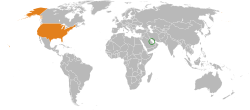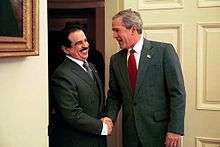Bahrain–United States relations
 |
|
Bahrain |
United States |
|---|---|
| Diplomatic Mission | |
| Bahraini Embassy, Washington, D.C. | United States Embassy, Manama |
Bahrain–United States relations are bilateral relations between Bahrain and the United States. Bahrain and the United States are long-time close allies.
History
Bahrain has provided a base for U.S. naval activity in the Persian Gulf since 1947. When Bahrain became independent in 1971, the US-Bahrain relationship was formalized with the establishment of diplomatic relations, initiated by the diplomatic recognition of Bahrain as a sovereign state by the US. The U.S. embassy at Manama was opened September 21, 1971, and the country's first resident ambassador, Joseph W. Twinam, was sent in 1974.[1] The Bahraini embassy in Washington, DC, opened in 1977. In October 1991, Emir Isa bin Salman Al Khalifa made a state visit to Washington. In 2001, King Hamad bin Isa Al Khalifa made his first visit to the U.S. after succeeding his father in 1999. He returned to Washington on an official visit in January 2003. King Hamad made an official visit to Washington in November 2004 to meet with President Bush and cabinet-level officials.
Bahrain and the United States signed a Defense Cooperation Agreement in October 1991 granting U.S. forces access to Bahraini facilities and ensuring the right to pre-position material for future crises. Bahrain is the headquarters of the U.S. Navy's Fifth Fleet. The U.S. designated Bahrain a Major non-NATO ally in October 2001.
The American Mission Hospital, affiliated with the National Evangelical Church (Bahrain), has operated continuously in Bahrain for more than a century.
Expulsion of a visiting U.S. official
In July 2014, while visiting Bahrain, Assistant Secretary of State for Democracy, Human Rights, and Labor Tom Malinowski was expelled by the country's government after Malinowski met with members of al-Wefaq, a leading Shia opposition group.[2][3][4][5] Malinowski was expected to visit Bahrain for three days, and had meetings scheduled with al-Wefaq, government officials, and a leading human rights activist, Nabeel Rjab.[2] The foreign ministry of Bahrain argued that Malinowski's activities "ran counter to conventional diplomatic norms," but also noted that the expulsion would not affect Bahrain–United States relations.[2] The government of Bahrain also demanded that a representative of its foreign ministry be present at private meetings between Malinowski and members of al-Wefaq, and claimed that before Malinowski's arrival, there was "prior agreement" on this matter.[6]
Malinowski criticized the Bahrain government's decision as an attempt at "undermining dialogue."[7] State Department Spokesperson Jen Psaki said that the U.S. was "deeply concerned" and that the Bahrain government's actions were "not consistent with the strong partnership between the United States and Bahrain."[7][8] Secretary of State John Kerry called Bahrain's request to have a government official present at Malinowski's meetings "highly unusual" and an "unacceptable requirement that runs contrary to international diplomatic protocol."[6]
Malinowski returned to Bahrain in December 2014, along with Assistant Secretary of State for Near Eastern Affairs Anne W. Patterson.[9][10][11]
Diplomatic missions
The U.S. Ambassador to Bahrain is William V. Roebuck.
In June 2008, Bahrain appointed Houda Nounou as an Ambassador to the United States.[12]
-

President George W. Bush welcomes King Hamad bin Isa Al Khalifa of Bahrain to the Oval Office on 29 November 2004
External links
References
![]() This article incorporates public domain material from the United States Department of State website http://www.state.gov/r/pa/ei/bgn/index.htm (Background Notes).
This article incorporates public domain material from the United States Department of State website http://www.state.gov/r/pa/ei/bgn/index.htm (Background Notes).
- ↑ "A Guide to the United States' History of Recognition, Diplomatic, and Consular Relations, by Country, since 1776: Bahrain". US State Department. Retrieved 4 April 2013.
- 1 2 3 "US diplomat Tom Malinowski expelled from Bahrain". BBC News. July 7, 2014. Retrieved April 1, 2016.
- ↑ "Bahrain: U.S. diplomat 'unwelcome and should immediately leave'". CNN. July 8, 2014. Retrieved April 1, 2016.
- ↑ "Bahrain expels top US diplomat after meeting with main opposition group". RT. July 7, 2014. Retrieved April 1, 2016.
- ↑ "Visiting US diplomat ordered to leave Bahrain 'immediately'". Bahrain News.Net. Retrieved 8 July 2014.
- 1 2 Schwartz, Felicia (July 14, 2014). "Tension Between Bahrain and U.S. Continues Over Diplomat's Expulsion". Wall Street Journal. Retrieved April 1, 2016.
- 1 2 "Expelled US diplomat Tom Malinowski condemns Bahrain". BBC News. July 8, 2014. Retrieved April 1, 2016.
- ↑ "Statement on the Decision by the Government of Bahrain To Find Assistant Secretary Malinowski Persona Non Grata and To Expel Him From Bahrain". U.S. Department of State. July 7, 2014. Retrieved April 1, 2016.
- ↑ Gordon, Michael (December 3, 2014). "Expelled U.S. Official to Return to Bahrain". New York Times. Retrieved April 1, 2016.
- ↑ "Expelled U.S. diplomat to return to Bahrain". Military Times. December 2, 2014. Retrieved April 1, 2016.
- ↑ "Press Availability with A/S Tom Malinowski and A/S Anne Patterson". U.S. Department of State. December 4, 2014. Retrieved April 1, 2016.
- ↑ "Bahreïn persiste et signe", Radio Canada, June 8, 2008

.svg.png)